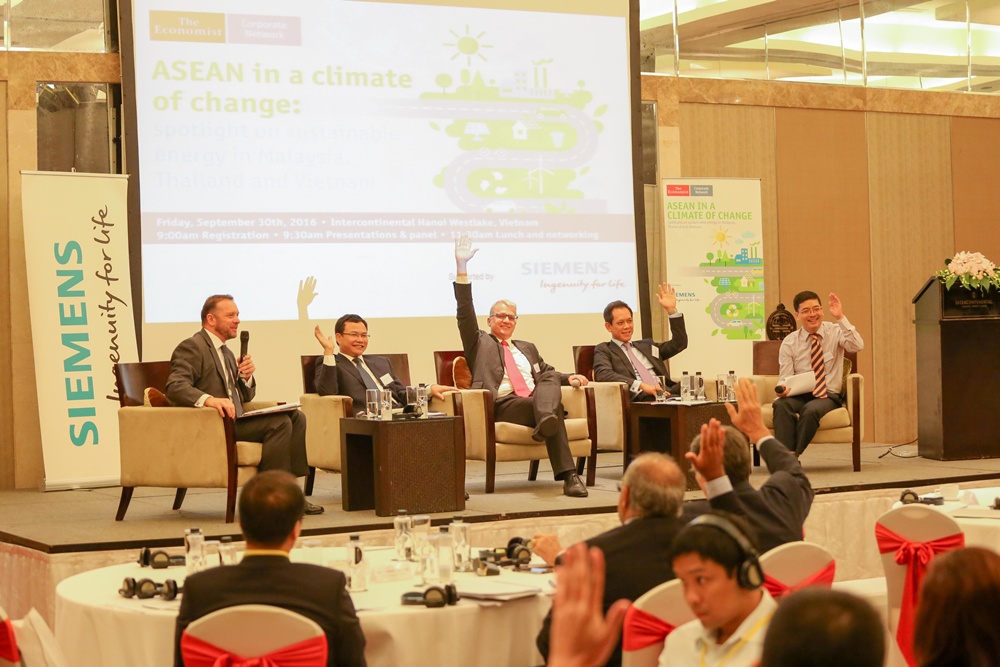Siemens Study on Climate Change
16:13 | 30/09/2016

Lauching the “ASEAN in a climate of change: spotlight on sustainable energy in Malaysia, Thailand and Vietnam” report.
The study maps out the policy landscape related to climate change in three key ASEAN economies: Malaysia, Thailand and Vietnam, and how the private sector in South-east Asia is responding to the challenge of a clean energy transition.
The launch was followed by a panel discussion on how Vietnam was guaranteeing economic and energy security while also facilitating a lower carbon energy system with a strong focus on the role of the private sector.
Through online survey and direct interview, the “ASEAN in a climate of change: spotlight on sustainable energy in Malaysia, Thailand and Vietnam” report collates the opinions of various players actively involved in energy-related investments, infrastructure as well as policy development from both the private and public sectors in South-east Asia. The study was carried out not only to gauge the attitudes of relevant industry players towards the climate policies in the region, but also, the role that the private sector could play in it.
Result of the study reinstates the fact that energy demand in the top six ASEAN economies continues to increase and as a consequence emissions are rising rapidly. Active participation outside government circles and collaborative partnerships between governments and private sector companies is reported as key to successful mitigation of emissions in the region. 64% percent of the survey respondents shares that the promotion of renewables would be the most efficient way of de-carbonizing energy systems while around 40% of them expects the private sector to play a primary role in mitigating climate change.
In Vietnam, emissions have been rising at robust rate over the last decade. According to the International Energy Agency (IEA), between 2006 and 2015 Vietnam’s energy-related CO2 emission has risen by an annual average of 10% due to rapid growth in its economy and in energy consumption. Vietnam’s INDC (Intended Nationally Determined Contributions) includes both a mitigation and adaptation component. With international support Vietnam has pledged a 25% reduction in emissions from its BAU (business-as-usual) scenario by 2030. The study reveals that the ability of Vietnam to do so will also depend on their capacity to attract a sufficient level of investment from the private sector.
Echoing the same judgment during the panel discussion, all five key panelists including Dr.Thai-Lai Pham, President & CEO, Siemens Ltd Vietnam; Mr Pham Van Tan, Deputy Director General for Climate Change and Vice Chief for Vietnam's Climate Change Negotiation Team, Ministry of Natural Resources and Environment of Vietnam; Mr Nguyen Ninh Hai, Deputy Director of New and Renewable Department, Ministry of Industry and Trade; Mr Franz Gerner, Lead Senior Economist for Energy of The World Bank, and Dr. Andy Staples, Director, Economist Corporate Network, South-east Asia, highlighted the need for the private sector to step up in the fight against climate change.
“At Siemens, we believe that the private sector has as much responsibility as the governments do, if not more, to actively engage in efforts to reduce GHG emissions and to help lead the transition to a low-carbon climate-resilient economy. As a world-leading technology infrastructure company, we believe that the challenges that climate change presents, can be resolved, in part, through technology; and that many of these solutions are already available today,” said Dr. Thai-Lai Pham, President and Chief Executive Officer, Siemens Vietnam.
“Siemens is committed to combating climate change and we aim to be the world's first major industrial company to achieve a net-zero carbon footprint by 2030. The company plans to cut its carbon dioxide (CO2) emissions – which currently total about 2.2 million metric tons a year – in half by as early as 2020. To achieve these goals, Siemens will invest some €100 million over the next three years in order to reduce the energy footprint of its production facilities and buildings,” added Dr. Lai.
Siemens AG (Berlin and Munich) is a global technology powerhouse that has stood for engineering excellence, innovation, quality, reliability and internationality for more than 165 years. The company is active in more than 200 countries, focusing on the areas of electrification, automation and digitalization.
One of the world’s largest producers of energy-efficient, resource-saving technologies, Siemens is No. 1 in offshore wind turbine construction, a leading supplier of gas and steam turbines for power generation, a major provider of power transmission solutions and a pioneer in infrastructure solutions as well as automation, drive and software solutions for industry. The company is also a leading provider of medical imaging equipment – such as computed tomography and magnetic resonance imaging systems – and a leader in laboratory diagnostics as well as clinical IT. In fiscal 2015, which ended on September 30, 2015, Siemens generated revenue of €75.6 billion and net income of €7.4 billion. At the end of September 2015, the company had around 348,000 employees worldwide.
VietnamEnergy.vn



